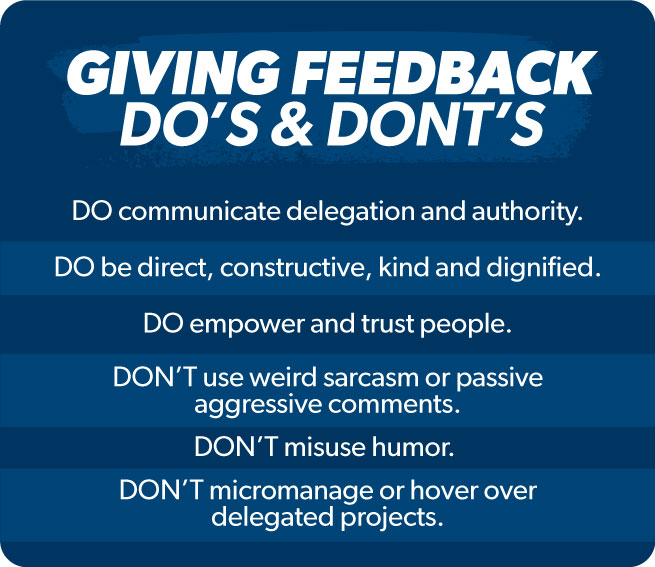How to Delegate to Your Team (With Red-Hot Confidence)
10 Min Read | Apr 17, 2025

Key Takeaways
- Sort your work. Take inventory of all your tasks. Keep what energizes you and things you’re good at (even if you don’t love them). Delegate things others can do better or faster.
- Pick the right people. Look for team members with integrity (consistency and character) and competency (skills and problem-solving ability).
- Match tasks to strengths. Identify team members’ skill sets and ensure their workload allows for new responsibilities.
- Coach—don’t micromanage. Make a strong handoff—introduce the task, coach the team member through it, and provide ongoing feedback.
- Give clear expectations. Define why the task matters, how it connects to their growth, and what success looks like.
- Provide feedback the right way. Be direct, constructive, and kind—no sarcasm or hovering.
- Think outside the box. If you don’t have the right team, consider outsourcing, automating or eliminating unnecessary tasks.
For most hot-blooded business leaders, fanning flames, putting out fires, and burning the candle at both ends feel as necessary as breathing. Why? Because you’re hell-bent on achieving your goals and building something great. But the truth is, your business will never grow beyond your ability to let go and delegate . . . something a lot of leaders suck at. But you can fix that! Learn how to delegate the right way—without stress or fear of losing control.
Delegate Definition: What It Is . . . and Isn’t
This is one of the most misunderstood and abused areas of leadership. Delegation is not handing off a task you hate and disappearing—or, just as awful, never cutting your umbilical cord to it. It’s recognizing your team’s skills and abilities and then trusting them to take on more responsibility so they can get more done (faster than you ever could).
Transferring the fire in your heart (and hands) to the right team members sets everyone up to burn brighter instead of burning out. But you’ll need to intentionally shift your mindset from doing the work to leading it. Start by seeing yourself more as a catalyst, consultant and coach and less as the muscle for all the heavy lifting. Sound hard? It is! Delegating—at first—is one of the hardest things you’ll do in business. But if you slow down to put the best delegation process in place now, you’ll be set to speed up later.
5 Benefits of Delegation
Successfully delegating is where you start to clear bottlenecks and make room for crazy success in your business. Delegation done right will:
- Lighten your load and stress so you can focus more on strategy and vision—and maybe even plan a personal getaway.
- Increase project ownership and company loyalty.
- Give others a growth path and motivation to learn new skills and knowledge.
- Activate momentum as your whole team becomes faster, stronger and better.
- Show your team that you believe in them, which boosts unity like nobody’s business.
In time, watching your team do tasks as good as (or better) than you will feel rewarding beyond anything you imagined—and your transformational leadership skills will transform others (go figure).
Free Delegation Course
EntreLeadership Elite’s Delegation course will show you how to entrust your business to the right people in the right way so you can finally enjoy that family vacation you’ve been dreaming of.
Top Reasons Why People Don’t Delegate, At Least Not Well
With all the benefits of delegating, you’d think leaders would be throwing out tasks like candy at a parade. But many choose not to delegate—at all. Or worse, they hand off the work and either micromanage it or give bad directions and then come in like a wrecking ball to undo or redo the task-gone-wrong. Yuck!
Maybe you’ve heard (or used) these excuses for why delegation “just doesn’t work”:
- It takes too long to teach somebody else.
- Nobody can do the task as good as me.
- I still like doing the task.
- I can’t risk losing control.
All these reasons boil down to two main problems:
- You don’t have the right people to delegate to.
- You’re a control freak.
Either way, you’re the problem. But that means you’re also the solution! You can learn how to delegate and throw the right rope to the right team member. You can even learn how to gradually lengthen it until you’re certain they can handle what you’re asking them to do.
Think of that first moment your mom or dad tossed you the keys to their car to go for a solo spin. Hopefully, that happened after hours of them riding shotgun, coaching you on when to go faster, when to pump the brakes, and how to manage unexpected traffic conditions. You got the keys to the kingdom after weeks and months of earning their trust.
Trust-building in business takes time too. But eventually, it creates margin for your company to grow.
Related article: Leadership Development: What It Is and 7 Signs You Need to Invest in Leadership Team Development
How to Delegate Like a Boss (the Good Kind)
To understand a better way of delegating, let’s key in on those half-hearted attempts we’ve all made. If you’re not a pro delegator yet, a simple and important first step is to take inventory of all your tasks—from annual planning and hiring to taking out the trash—and put them in the following categories:
- Work you’re good at and love. (Does it give you energy?)
- Work you’re bad at and hate. (Does it suck the life out of you, and do you suck at doing it?)
- Work you’re good at but don’t love. (Does another person have the drive to do it?)
- Work you’re bad at but like. (Does another person have the skill to do it faster and better?)
Your sweet spot is Category 1—with Category 3 right behind it . . . because there’s always work we have to do, even if we wish we didn’t.
Pro tip: Letting go of other tasks may make this kind of work less of a killjoy.
The other categories are up for delegating to team members—but you don’t just dump the work on them. There’s a process.
Your next move is to identify people in your organization who show integrity and competency.
Psychologist and New York Times bestselling author Henry Cloud explains that integrity comes from the root word “integer.” An integer is any whole number—no fractions. In life, integrity means living in wholeness—no splits or hypocrisy. It’s being the same person with the same general behavior in any setting. Look for positive team members who model consistency no matter how much time you spend with them.
As for competency, this is more than the ability to accomplish the task. Competency involves how the task is accomplished. Were problems solved correctly? Team members and customers respected? Budgets met? Details managed? Cloud explains, “Character = the ability to meet the demands of reality.”
People with the character to be delegation-worthy are:
- Mature enough to know their limitations
- Know when to ask for help
- Consistently show a level of excellence and the diligence to maintain it
They’re also courageous enough to bring you bad news when it’s called for, and they don’t hide anything.
With these guidelines in mind, now list your key team members and their roles.
What are their skill sets? What are they good at? How could they grow? Look over your list and note who’s a natural fit to take over the tasks you’re ready to move. What is that person’s current workload? Give the right tasks to the right people. Also, be ready to remove tasks from their plate if you need to so they have room to conquer their new opportunities.
Coach Your Team Member to Win
At this point, you might feel like the earth’s shifting under your feet. The love-hate relationship with delegation is real! It will almost always feel stressful at first, but you’ve got this—and so does your team member (who’s probably been waiting for their moment to shine). Set them up to win by remembering these tips:
- Start with a high-level conversation that introduces the opportunity coming their way. Let your team member know you’re putting together the hand-off process so they can take it and run.
- Give a detailed description once you’ve solidified your plan. This is where you get down in the weeds of what you need and expect. Understanding Key Results Areas (KRAs) can help. If you don’t clearly communicate your expectations, the job will never be completed to your satisfaction.
- Define why the task is important.
- Explain why the person was chosen. How are they qualified?
- Tell them how the task connects with their journey and career goals.
- Let them know you’re committed to coaching them thoroughly and giving them the resources to win.
- Remind yourself and your team member that practice makes you better. Allow grace along the way.
- Be a coach, not a cop. You’re not just barking out task assignments—you’re connecting them with the person’s purpose.
Your Guide to Teaching, Coaching and Giving Feedback
Not all of us can be as epic as Mr. Miyagi in Karate Kid. But using the three-step process below will help you help your team members experience their own “wax on, wax off” learning moment:
- Do the task while the team member observes. Let them ask questions.
- Have them do the task while you coach them. Pro tip: Before they begin, ask permission to give feedback either as they go or at the end. This will calm their nerves, show respect, and set expectations.
- Have them do the task alone, with you checking in periodically. This is accountability, not micromanagement. You don’t want your team member floating blindly, only to learn after the fact that the result isn’t what you wanted. You also don’t want to stand over their shoulder the whole time barking out directions. Walk the line of trusting and giving freedom while also coaching and guiding their growth.
Here are a few do’s and don’ts for you to follow as you’re giving feedback:
- Don’t be weird. Feedback only gets weird if you make it weird, so don’t. No sarcasm. No passive-aggressive comments. No weird.
- Don’t attempt to bring in humor that could be misinterpreted.
- Don’t delegate work and then look over the person’s shoulder.
- Do be direct, constructive, kind and dignified.
- Do empower and trust people.
- Do communicate to the rest of the team that the task is delegated and another person has authority.
Related articles:
11 Productivity Tips for Small-Business Owners: Manage Your Day and Your To-Do List
5 Simple Steps for Successful Time Management for Entrepreneurs
Don’t Have the Right Team Yet? Think Outside the Delegation Box
Ultimately, the best way to set yourself up for confident delegation is to get the hiring process right in the first place. Ask yourself if you’re hiring people who have the potential to earn your trust and demonstrate integrity and competency. If you’ve got people on your team who aren’t carrying their weight, it may be time for a hard conversation.
Sometimes, as you’re growing a business, you just can’t hire who you need quite yet. That’s okay. You’ve got other options and can work toward later hires to help share the load. Here are three things you can do now:
- Outsource the work to another company or person. Competency and integrity still matter, so don’t rush. Ask for recommendations from colleagues, and don’t be afraid to dig into backgrounds so you’re sure your outsourcing solutions fit your needs and values.Pro tip: Avoid outsourcing any type of money-related task. The wrong person in the wrong financial seat can destroy your company. You should know and trust the person well before you allow them to handle your money.
- Automate the task. Look for a software program or other technology to manage tasks, from customer relationships to email marketing.
- Delete the task entirely. Yes, that’s a thing. If the task is bogging down the team and barely profitable, stop and critique it. If it’s more stressful and complicated than it is helpful, delete it.
What’s Next: Get Our Free Delegation Course
EntreLeadership Elite’s Delegation course will show you how to entrust your business to the right people in the right way so you can finally enjoy that family vacation you’ve been dreaming of.


